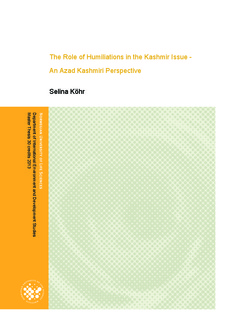The role of humiliations in the Kashmir Issue : an Azad Kashmiri perspective
Master thesis
Permanent lenke
http://hdl.handle.net/11250/187988Utgivelsesdato
2014-02-19Metadata
Vis full innførselSamlinger
Sammendrag
The primary objective of this work is to improve the understanding of the Azad Kashmiri perspective on their situation and the Kashmir conflict in general. To achieve this, qualitative interviews in Pakistan and Azad Kashmir were conducted and analysed with the help of the humiliation theory. The secondary objective was to challenge the theory on its applicability on multi-party conflicts: what can the humiliation theory learn from the case?
The present research suggested that humiliations from the Pakistani side strengthened the Azad Kashmiri nationalism and the stance for a re-united, independent Kashmir. The past and the expected continuation of present humiliations from the Indian side create an atmosphere in Azad Kashmir that supports, or at least, tolerates a militant freedom struggle. Furthermore, the neglect of Azad Kashmir’s right to self-determination and the enforced division of Kashmir were perceived to be humiliating. This last set of humiliations causes Azad Kashmiris to either demand a plebiscite as suggested by the UN or an inclusion of Kashmiri representatives in the reconciliation process between India and Pakistan. The aim of the latter group is to find a mutually acceptable solution of the Kashmir issue for all three parties: India, Pakistan and Kashmir.
Regarding the second objective, the present thesis found that most types as well as features and dynamics of humiliation are at work in Azad Kashmir. The case suggests two additional types or, at least, subgroups of humiliation: The loss of identity as well as being neglected or ignored can be seen as humiliating. Moreover, two additional mechanisms can be identified from the case: First that the destroyed hope for dignity can increase feelings of humiliation and mobilise people, and second that interpersonal contact between humiliators and humiliatees can reduce feelings of humiliation. Furthermore, the case suggests an enhancement of the humiliation model for conflicts with three parties. The thesis suggests that further research on India and Pakistan can help increase the awareness about reciprocal humiliations and find the point of equal dignity that symbolises a mutually acceptable solution.
